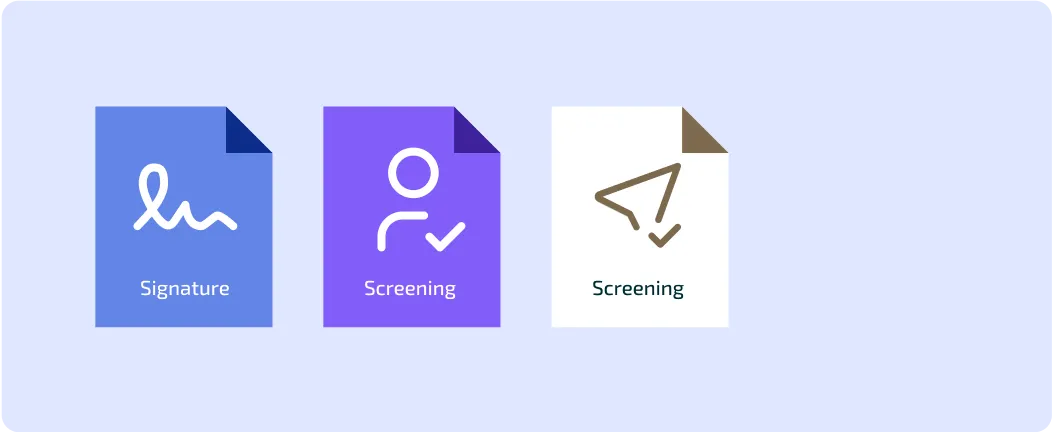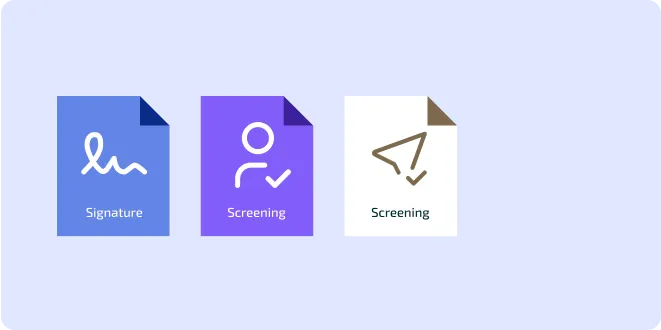.webp)
Published on
March 18, 2025
What is Sanctions List? AML Sanctions for a Secure Financial System
In this story

Accelerate AML Compliance: Meet Regulatory Demands with 80% Less Setup Time
.svg)
.svg)
In this digital and interconnected age, one of governments and financial institutions’ primary goals is to sustain the integrity of their financial systems and prevent illicit activities. Basic solutions cannot perform independently, so these entities must utilize a complex network of mechanisms and tools.
One essential element within this network is the AML (Anti-Money Laundering) sanctions list. In this article, we will explore the following questions: What is a sanctions list? Why is it important? And how does it contribute to financial stability and international security?
What is Sanctions List?
The AML sanctions list, also referred to as sanction list, the sanctions list, or list based sanctions, is an exhaustive list of people, organisations, and entities that are bound to different sanctions and restrictions imposed by international organisations and governments. This makes the AML sanctions list crucial for preventing money laundering and terrorist financing.
The AML Sanctions List in Action
Now that we answered the first question: what is a sanctions list? We will move on to addressing the significance of the sanction lists. Imagine the AML sanctions list as a shield against funds used for illegal activities, such as drug trafficking, terrorism funding, and other illicit purposes.
The sanction list is like an airport screening tool that transactions must pass through, and it checks individuals and institutions involved in the transaction against the list to rule out and prevent illegal purposes.
The Role of AML Sanctions in Modern Banking
AML sanctions can be useful and essential to many of financial institutions, such as insurance companies, security firms, and money service businesses. However, since banks are the main gatekeepers to the international financial system, they are leading the charge in the application of AML sanctions and sanction screening lists.
Why are AML Sanctions Crucial for the Financial Sector?
- AML sanctions shield financial institutions from unintentionally aiding in money laundering or terrorism financing.
- AML sanctions contribute to the financial sector’s adherence to higher transparency and integrity.
- AML sanctions promote global cooperation and information exchange between financial institutions and local governments.
A Closer Look at AML Sanctions
Types of AML Sanctions
As part of the robust and complex AML mechanisms, the AML sanctions take many different forms. In order to completely comprehend the implications of their different approaches, it is imperative to understand the distinctions between them. Standard AML sanctions include:
- Asset Freezing: This entails preventing access of individuals or groups on the sanctions list to their assets. The purpose is to block them from using the funds for illegal purposes.
- Travel Bans: This indicates subjecting some people to the sanctions to travel bans. The purpose is to prevent them from moving across borders freely.
- Arms Embargoes: Depending on the case, sales of arms could be restricted for counties and entities that are part of illegal activities.
- Trade Restrictions: This entails imposing restrictions on trade in specific countries and entities. Consequently impairing their economic activities.
- Financial Restrictions: Some sanctions can impose restrictions on financial transactions on wire transfers or other services.
The Evolution of AML Sanctions
Like all international regulations, AML sanctions must adjust and evolve to the needs of global efforts battling money laundering and terrorist financing. Emerging global threats and challenges have led to closely-tied changes in the sanctions across the years.
Key Milestones in AML Sanctions
- The USA PATRIOT Act: Enacted following the events of September 11,2001. A stronger system for preventing money laundering and financing of terrorism was introduced by this legislation.
- The Financial Action Task Force (FATF): Established in 1989, this intergovernmental organisation sets international guidelines for countering terrorism financing and money laundering. (Read more about FATF’s Grey lists and Blacklists)
- UN Security Council Resolutions: Passed by the United Nations Security Council, alongside other resolutions, to force sanctions on countries and entities involved in terrorism and other illegal activities.
- EU Sanctions: Maintained by the European Union and advancing international efforts to stop money laundering and terrorism financing.
- National Sanctions Lists: Maintained nationally by various countries. They target people and entities that are considered a threat to national financial systems.
Comply quickly with local/global regulations with 80% less setup time
.svg)
.svg)
The Role of Technology in AML Sanctions List Screening
Now that we have laid out an understanding of what is a sanctions list, and the intricacies and complexities behind the AML sanctions list. You might have concluded that sanction list screening is a highly labor-intensive task.
This is precisely why modern financial organizations and institutions have transferred the task of streamlining screening to technological and advanced software solutions.
Benefits of Automated AML Sanctions List Screening
- Efficiency: Automation allows for real-time checks during transactions by drastically cutting down on the time and effort needed for screening.
- Accuracy: Automation reduces the risk of human errors and ensures that every potential match with the sanction list is analyzed and not overlooked.
- Scalability: Automation systems can process large volumes of transactions, meaning they can benefit both big and small financial institutions.
- Regulatory Compliance: Automated AML sanction list screening upholds institutions’ compliance with regulatory requirements.
AML Sanctions by the Numbers
Now that you have a theoretical grasp of the significance of AML sanctions, we will present you with some key statistics to relay the real-world importance of this tool. Gathering numbers from credible studies and reports tells us that:
- According to a 2021 report by the Financial Action Task Force (FATF), over 1,800 people and organizations were subject to sanctions by FATF members. These actions are essential in reducing money laundering on a worldwide scale.
- According to a study conducted by a leading cybersecurity firm, financial institutions using automated screening against AML sanctions reduced false positives by 40%. Automation, thus saving them valuable resources and company time.
- According to the World Bank, AML sanctions played a significant role in reducing the flow of illegal funds. This created barriers for criminals to launder money through the financial system.
Read more about the 5 Core Benefits of Automation for Financial Institutions & Compliance
AML Sanctions List vs. Sanctions Watchlist
At this point, you might have noticed that sanctions’ terminology can be confusing. Often, terms such as sanctions watchlist, AML sanctions list, and sanctions screening lists are used interchangeably. However, it is important to recognize the distinctions between these terms.
AML Sanctions List
What is a sanctions list? The AML sanctions list is a comprehensive list of people, organizations, and entities that can be subjected to different restrictions, limitations, and sanctions.
Sanctions Watchlist
- A sanctions watchlist is an umbrella term that includes sanctions related to trade and foreign policy in addition to AML sanctions.
- A sanctions watchlist can encompass people and entities under trade restrictions, arms embargoes, and other non-AML-related sanctions.
- Financial institutions usually use sanctions watchlists to guarantee compliance with several sanctions, not only limited to anti-money laundering.
The Importance of AML Sanctions in Banking
We have previously established why AML sanctions are particularly important in modern banking, but why?
- Protection: Banking sanctions list can safeguard financial institutions from becoming unwilling accessories to illegal activities.
- Integrity: Banking sanctions list can aid in preserving the integrity of the international financial system by stopping illicit funds flow.
- Cooperation: AML sanctions promote international collaboration between governments and financial institutions towards battling money laundering and terrorism financing.
AML Sanctions and Regulatory Compliance
Financial institutions ensuring their continuous compliance with international AML standards and regulations is one of their biggest challenges.
The Role of Regulatory Authorities
- Regulatory authorities, like the Financial Crimes Enforcement Network (FinCEN) in the United States, serve a crucial role in establishing and enforcing AML regulations.
- Regulatory authorities update AML guidelines regularly to reflect evolving threats and challenges in the global and local financial sectors.
Consequences of Non-Compliance
Failure to comply with AML sanctions and regulations can cause severe repercussions for financial institutions, including:
- Fines: If institutions fail to comply with their AML obligations, regulators have the power to penalize them with hefty fines.
- Reputation Damage: Failure to comply can lead to reputational repercussions and a loss of trust for financial institutions, which can be hard to recover from.
- Legal Action: Depending on the case, non-compliance can result in legal action against the financial institution or its employees.
Tips for Effective AML Sanctions List Screening
How to Improve Your AML Compliance?
Your financial institution's operations must incorporate efficient AML sanctions list screening. This section will offer you practical tips for strengthening your efforts for AML compliance:
1. Invest in Automation
As previously mentioned, automated screening for sanction screening lists can significantly increase efficiency and accuracy while reducing false positives and the waste of resources and time.
2. Regular Training
Make sure your staff has received adequate training on AML compliance. Employees can stay up to date on the newest rules and procedures with the utilization of regular training programs.
3. Periodic Risk Assessments
Conduct consistent and regular risk assessments to catch potential weaknesses in the AML compliance program. This will ensure you are always one step ahead in any potential issues you may face.
4. Stay Informed
Stay up to date on modifications to AML regulations and lists of sanctions. Make sure to continuously review updates from regulatory authorities and adjust your processes accordingly.
AML Sanctions in the Future
This article has portrayed that emerging threats and technological advancements are driving a continuous evolution in the landscape of AML sanctions. To ensure your agility and compliance, make sure to watch out for these essential trends in the future:
1. Technological Advancements
Advanced technologies such as machine learning and artificial intelligence will continue to hold a more significant role in AML sanctions list screening, to increase accuracy and efficiency.
2. Enhanced Global Cooperation
With past, present, and future global events in mind, international institutions and governments have recognized the inescapable interconnectedness of the world. Thus, international cooperation in the fight against money laundering and financing of terrorism will become even more crucial.
3. Regulatory Changes
Anticipate regular updates and tweaks in AML regulations as governments adapt to new challenges in the financial sector.
4. More Comprehensive Sanctions Lists
Expect sanctions lists to continue to expand and eventually encompass a larger range of people and entities involved in illegal activities.
Conclusion
To summarize, this article has answered important questions about the AML sanctions list, starting with what is a sanctions list and ending with tips to keep you ahead of the curve.
By now, you recognize that the AML sanctions list is a vital factor in the global efforts of battling money laundering and terrorism financing. It is one of the most essential mechanisms for governments, financial institutions, and international organizations to protect the integrity of the financial system.
It has become apparent that financial threats will continue to evolve. Thus, AML sanctions will continue to hold a critical role in upholding integrity, security, and transparency of the financial sector.
Financial institutions can help create a more safe and secure financial environment for everyone by understanding the importance of AML sanctions and staying up to date on regulatory changes.
The most important takeaway point of this article is that AML sanctions list screening is not solely a regulatory requirement, but an essential and pivotal factor in maintaining the security and integrity of the international financial system.
Streamline Compliance: Achieve 80% Faster Setup for Fraud Prevention
.svg)
.svg)

How Aseel reduced onboarding time by more than 87% using FOCAL
Learn how FOCAL empowered Aseel to achieve new milestones.
.svg)
.svg)
Mastering Fraud Prevention: A Comprehensive Guide for KSA and MENA Businesses
51% of organizations fell victim to fraud in the last two years, don't be caught off guard, act proactively.
.svg)
.svg)
Featured blog posts
.svg)





AI-Driven Precision in Fraud Risk and AML Compliance
.svg)
.svg)

.svg)
.png)






.webp)




.svg)








%20(1).webp)
Comments
Leave a Reply
Comment policy: We love comments and appreciate the time that readers spend to share ideas and give feedback. However, all comments are manually moderated and those deemed to be spam or solely promotional will be deleted.